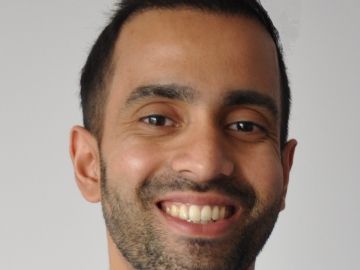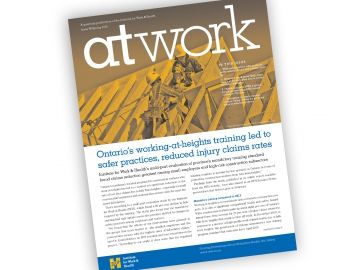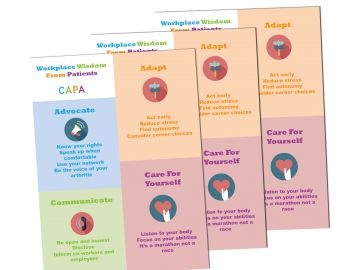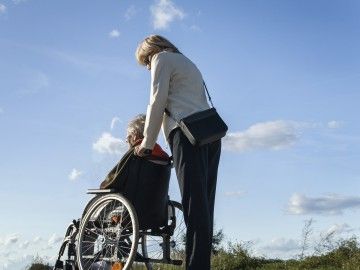What's new

Now hiring: Manager, Knowledge transfer & exchange
The Institute is currently seeking a qualified person to fill the position of Manager, Knowledge Transfer & Exchange. As a member of the Institute’s management team, this person will be responsible for supervising our knowledge transfer activities and direct a team of knowledge transfer associates in building vibrant relations with thought leaders in organized labour, employer communities, health care, occupational health and safety, disability management and regulatory authorities. The deadline for application is October 25, 2019.

Manitoba OHS dashboard lets companies compare themselves with the competition
Ever wonder how your company stacks up against your competitors on occupational health and safety (OHS) performance? Building construction companies in Manitoba can now do just that. Developed by IWH and the Construction Safety Association of Manitoba (CSAM), the INDICATOR dashboard and benchmark lets building construction employers in the province compare themselves against others of the same size, subsector or region on several OHS leading indicators. In a recent At Work article, IWH Senior Scientist Dr. Ben Amick explains how this benchmark stands out from the rest.

Supervisor’s response to work injury matters to return to work: Our latest video
Supervisors are busy. They’re always juggling multiple demands for their time and attention. But that moment when they learn a worker is injured, do they react with concern and empathy or blame and skepticism? As the latest research-based video from the Institute sums up, a supervisor’s response can make a difference to whether an injured worker returns to work successfully within a few months. It’s one of the ways supervisors matter.

IWH’s Dr. Arif Jetha promoted to scientist
Congratulations to Dr. Arif Jetha, who has been promoted from associate scientist to scientist at the Institute. Jetha, who joined IWH in 2015 as a Mustard post-doctoral fellow, focuses his research on life-course differences in the work participation of people living with chronic disabling conditions, with a particular interest in the early labour market experiences of millennial young adults. Details about Jetha’s projects are available on his IWH website bio page.

Topic pages now posted on the IWH website
Looking for research findings and resources on our website about a particular topic? Try our “Selected topics” page. You'll find it under “Our research” on the drop-down menu. From aging to young workers, from cannabis to violence at work, from health care to construction, we might just have the collection of research summaries, journal articles, tools and presentations on your topic of interest.

Link between “newness” and higher injury risk confirmed by systematic review
Workers new to a job, regardless of their age, face higher risks of injury. This workplace health and safety message is based on several studies—including some by the Institute for Work & Health (IWH)—and it has spread far and wide. However, it was only recently that a systematic review on newness and injury risk was carried out. The review, conducted by IWH, confirms a link between newness and the risk of acute injuries—but is inconclusive on the link between newness and the risk of musculoskeletal disorders.

Understanding the types of workplaces that offer both OHS and wellness programs
Research suggests that occupational health and safety (OHS) and health promotion programs provide greater benefits to workers’ overall health when they are integrated within an organization’s health and safety strategy. To learn about the types of workplaces where such integration might be easier to implement, a new IWH study set out to learn the common characteristics of Ontario workplaces that offer both. Findings are now summarized in a new Research Highlights.

The summer 2019 issue of At Work is out
The latest issue of the Institute for Work & Health's quarterly newsletter, At Work, is now out. In the Summer 2019 issue, read about retirement expectations among boomers with chronic conditions, the use of IWH's leading indicators in a health and safety assessment tool built for Manitoba's building construction employers, the economic case for raising worker awareness about caregiving supports, and more.

What research can do: IWH research helps prevention system shift focus from young to new workers
You know research has had an impact when it changes the language used to frame an issue, and the findings become so ubiquitous they are considered part of the “common wisdom.” That seems to be the case with IWH’s research on injury risks and new workers.

IWH Updates - Summer 2019
IWH’s Dr. Arif Jetha receives federal grant for innovative research ~ New project to examine financial incentives to encourage the hiring of people with disabilities ~ Call for abstracts for World Congress 2020 soon to come

What an aging workforce means for injury and RTW outcomes
As the average age of Canadian workers continues to rise, employers may wonder about the effects on work injury, recovery, return to work and remaining at work. Some may expect that risks of injury are higher among older workers, that their injuries are more severe, or that timelines to recover and return to work are longer. However, findings from recent studies, including several conducted at IWH, paint a more nuanced picture. We summarized the evidence in an article published this spring in the Ontario Occupational Health Nurses Association (OOHNA) Journal.

When and how do financial incentives work to encourage the hiring of people with disabilities?
Wage subsidies and other financial supports are widely used by Canadian governments to encourage employers to hire people with disabilities. Yet, employers, disability advocates, service providers and people with disabilities hold strong and often polarized views about the merits of these incentives. What's more, the research on the effectiveness of these policy instruments is surprisingly scarce. That's why an IWH team, in a new research project, is setting out to produce guidelines and resources on best use of financial incentives.

IWH appoints Dr. Avi Biswas to scientific ranks
Congratulations to Dr. Aviroop Biswas, who joined the Institute as associate scientist in May, when he completed his two-year Mustard post-doctoral fellowship at IWH. Biswas holds a PhD in health services research at the University of Toronto’s Institute of Health Policy, Management and Evaluation. He was a recipient of a doctoral research fellowship from the Toronto Rehabilitation Institute and the University of Toronto’s Ted Goldberg Award for academic excellence and promise in health services research.

Psychosocial work conditions linked with both positive and negative mental health outcomes, study finds
Better psychosocial work conditions—greater job control, social support and job security—are linked with workers having reduced risks of mental disorders such as depression and anxiety. But a new study by IWH suggests they’re also linked with a greater likelihood of workers having flourishing mental health. Indeed, psychosocial work factors have a stronger link to positive mental well-being than to the likelihood of poor mental health.

5 things we think you should know about RTW
Ground your return-to-work programs and policies on evidence. Every April, the Institute for Work & Health (IWH) highlights five research findings from the previous year that we think can make a difference to workplace injury and disability prevention programs. We now unveil a new variation, "5 things we think you should know about RTW." It sums up five recommendations for improving your return-to-work and stay-at-work practices, based on recent research from IWH.

World Congress 2020, a global forum on emerging OHS issues, coming to Toronto
Occupational health and safety (OHS) professionals, get ready to take a break from the day-to-day issues and take in the big picture. In a little over a year, the most forward-thinking OHS policy-makers and practitioners from around the globe will gather in Toronto for the XXII World Congress on Safety and Health at Work. With the theme "Prevention in the Connected Age," the October 4-7, 2020, event will be your chance to hear and share ideas about the OHS challenges and innovations coming over the horizon.

Rates of workplace violence against women rising in Ontario’s education sector
Women working in Ontario’s education sector are four to six times more likely than their male counterparts to require time off work due to physical assaults on the job.This is according to a recent study from the Institute for Work & Health that looked at workplace violence rates among men and women across various sectors.

IWH associate scientist a recipient of Ottawa's New Frontiers in Research Fund
Congratulations to IWH Associate Scientist Dr. Arif Jetha, who has been awarded a grant from the Government of Canada's New Frontiers in Research Fund. The grant, announced this week, will support Jetha in a new research project examining the future of work and how the changing labour market may impact young people with disabilities.

IWH Speaker Series: Link between use of substances affecting central nervous system and workplace injuries, deaths
Prescription and recreational drugs that act on the central nervous system—for example, opioids, benzodiazepines and cannabis, among others—can have many adverse effects, including cognitive and psychomotor impairments. An IWH systematic review examined the links between the use of such substances and workplace injury and fatality risks. On May 28, IWH Associate Scientist Dr. Nancy Carnide shares findings from that systematic review at an IWH Speaker Series presentation.

What 5 things do we think you should know during NAOSH Week?
To help you mark this year’s North American Occupational Safety and Health (NAOSH) Week, taking place now from May 5-11, we offer you “5 things we think you should know”—five important research findings from the Institute for Work & Health (IWH) in the past year. We suggest you share these findings with your work colleagues and peers. They can give rise to good discussions—this week or any week of the year.

Now hiring: Strategic foresight specialist for a one-year project coordinator contract
The Institute is seeking a strategic foresight specialist for a project coordinator position. This person will work on a federally funded research project examining the future of work for young people with disabilities. The Canadian labour market is undergoing a substantial shift with the rise of automation and precarious work. What are the implications for young people with disabilities, who already face barriers accessing the labour market?

At Work Spring 2019 is out
The Spring 2019 issue of At Work is out! In this issue, read about a study evaluating the implementation and effectiveness of Ontario's mandatory working-at-heights training standard. Learn about the impact of unpaid caregiving responsibilities on women's work. See the trendlines for workplace violence in the two most at-risk sectors, broken down by gender.

What research can do: IWH collaboration with partners led to safety culture and system audit tool
The IRS CAAT is designed to measure "two sides of the coin"—an organization's OHS system and its safety culture. Developed by Workplace Safety North with industry support and IWH analysis, the tool is a testament to what research, in collaboration with front-line expertise, can achieve.

This Sunday, take a moment to mark Day of Mourning
The National Day of Mourning, held April 28 every year, is a day to remember all those who have lost their lives or suffered health consequences due to work hazards. Many of the Institute's partner organizations in the prevention system are sharing stories or holding events to mark the day.

IWH Updates - Spring 2019
Long-time IWH senior scientist receives lifetime achievement award ~ IWH welcomes new member of Scientific Advisory Committee ~ Announcing new Mustard Fellow 2019/20

See you at Partners in Prevention 2019
Are you going to Partners in Prevention on April 30-May 1? Come by our booth (Booth #525) to check out the latest IWH research findings and tools, and to pick up your copy of our popular handout, “5 things we think you should know.” While you’re there, get details about the XXII World Congress on Safety and Health at Work, a global forum on emerging challenges and cutting-edge best practices in occupational health and safety. The World Congress 2020, co-hosted by IWH and the Canadian Centre for Occupational Health and Safety (CCOHS), is coming to Toronto October 4-7, 2020.

Ontario's mandatory working-at-heights training led to safer practices and reduced claims rates
Falls from heights are a significant occupational health and safety hazard. In 2015, Ontario’s Ministry of Labour implemented a mandatory training program to better protect construction workers who work at heights. An evaluation study by a team at the Institute for Work & Health has found that the training had high uptake across the province. It also led to a decline in claims rates due to falls targeted by the training—especially among very small employers and construction subsectors with the most frequent fall injuries.

Arthritis advocacy organization develops resources with IWH research
For the three in five Canadians with arthritis who are of working age, a diagnosis can have considerable impact on work. The Canadian Arthritis Patient Alliance (CAPA), a Canada-wide, patient-driven grassroots organization, recently developed a set of resources for patients on managing the condition at work. To develop the resources, CAPA surveyed its members on employment needs and integrated research, including studies conducted by IWH. The Institute’s Dr Arif Jetha, especially, worked closely with CAPA to provide the evidence behind the messages.

News release: women experience more work disruptions due to eldercare
The burden of caring for an older relative falls more on women than on men, and it’s showing up in women's higher rates of work disruption. According to a new Institute for Work & Health study, women are more likely than men to stop working, to work part-time or to take time off work during the week due to eldercare. The open access study is published in the Journals of Gerontology.

What supports, and how much, do boomers with chronic diseases need?
Older workers with diabetes or arthritis experience more fatigue and pain. But how different are they from healthy older workers in their need for, and use of, workplace accommodation and supports? An open access IWH study examined this question. It also looked at differences in work outcomes when people have access to supports when they’re needed.

International expert on work precarity and health inequity speaking in Toronto on April 11
Precarious employment is prevalent in low-income countries where as many as three in four workers are employed in the informal economy. Work precarity is also on the rise in high-income countries, where its effects are felt most by young workers, women, migrants and ethnic minorities. On April 11, Dr. Joan Benach, director of the Health Inequalities Research Group at Pompeu Fabra University in Barcelona, Spain, delivers the John R. Evans Lectureship in Global Health. The lecture, co-hosted by IWH, is free and open to the public.